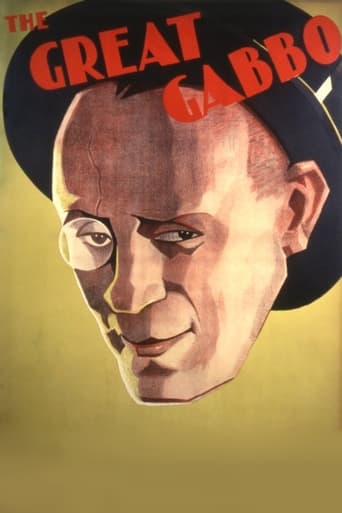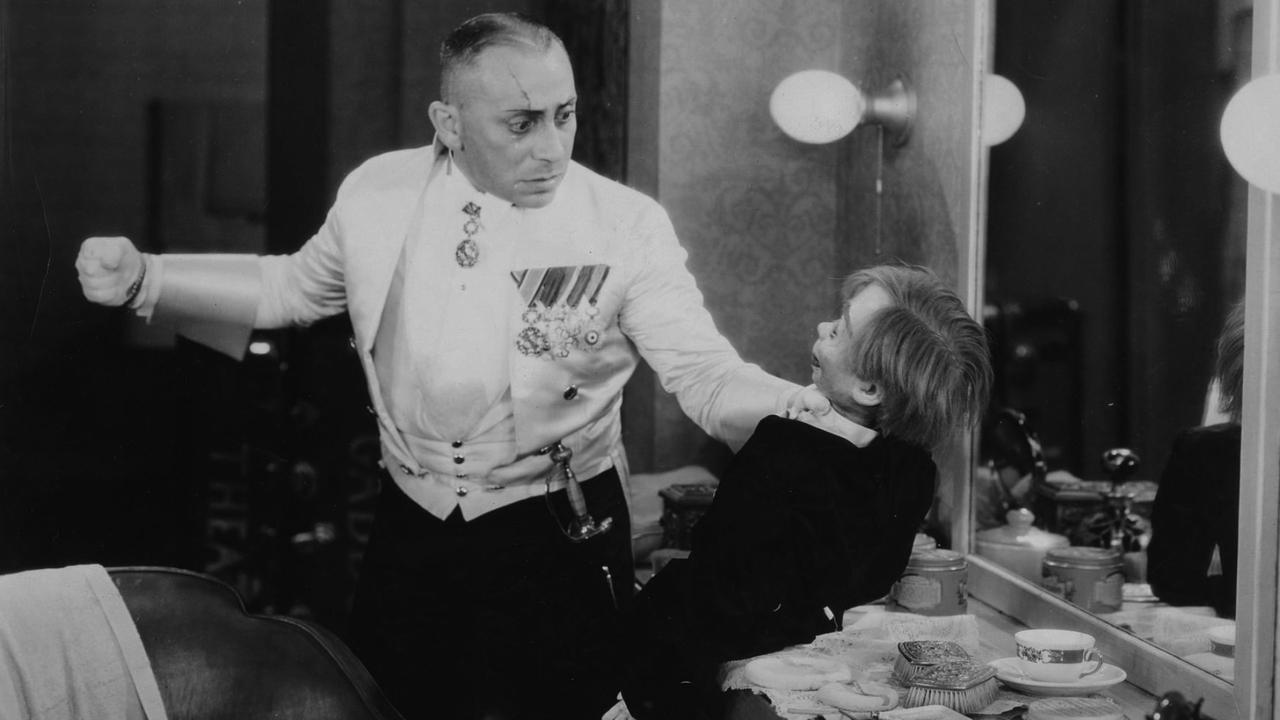Stephen Abell
This is a strange little number because it's a pretty dark subject matter, which at times is pretty chilling to watch, but then they throw in lots of songs. I'm not too sure what the Directors were going for when they filmed this. I say this because it's evident, at times, that quite a few scenes were added later... and I cannot figure out why.I really like the idea of the mad ventriloquist. In this stories concept, he is in love with his assistant, Mary (Compson), though finds it hard to fully converse with her. As The Great Gabbo (Erich von Stroheim), as he sees himself, he's nasty, offensive, and disagreeable. However, when he speaks through the dummy he can be loving and charming. It's this fissure that eventually leads to his mental breakdown.I know that the musical moments are there because it's set in the vaudeville and theatre life, though for most of the time these feel more like padding - filling out time. I think this could be remade and be an actually powerful movie. Reduce the musical side and expand on the breakdown. There are times in this movie where chills ran down my spine. The part where Mary walks out on The Great Gabbo and the Dummy calls her softly back, to be reprimanded by Gabbo is both heartbreaking and creepy as hell.The film, in general, is entertaining, though I have to say I found the number of musical intermissions too much. These are also 1920's musicals so are not so relevant today. Also, the dancing isn't up to par with bigger productions. Though I have to say the scene where Mary throws herself off a giant spiders web to be caught inches from the ground is breathtaking. I would say, for all creepy doll fans and those who like a psychological edge to their dramas, it's worth a watch.
mark.waltz
O.K., so Erich Con Stroheim ain't Garbo, but as Gabbo, he has the personality of somebody who belongs in solitary confinement. He is emotionally and verbally cruel to his beautiful girlfriend Betty Compson, and when she threatens to leave him, he simply acts like he doesn't give a damn. The very autocratic von Stroheim makes Otto Preminger look like a pussy cat, and while many of his later roles lacked in humor while playing very severe brooding older men, here he is actually quite funny. I don't think that there is anything funny about mental abuse, but the way von Stroheim plays the part, his character is so phony that he makes his dummy look real. Yes, von Stroheim plays a ventriloquist, although not a very good one. Even though his character is a headliner in vaudeville shows and eventually makes it to Broadway, it is obvious that he is not actually speaking when the dummy speaks. It is obvious through his singing that somebody else is doing that, and that makes this unintentionally funny.Even funnier are the ancient musical numbers, some so funny and bizarrely staged that they have to be seen to be believed. "Every Now and Then" is actually one of the best numbers of the early sound era, with the chorus girls and boys wearing white in the front and black in the back, and when they turned it gives a very interesting effect. Another musical oddity is a musical number utilizing a giant spider web, resembling some of the most over-the-top musical numbers of this time, including the "Turn on the Heat" production number from 'Sunny Side Up", the giant idol dance from "Just Imagine" and Winnie Lightner's camp classic "Singing in the Bathtub" from "Show of Shows". Fortunately von Stroheim doesn't get involved in the dancing, only singing or pretending to, when his dummy is singing. Betty Compson is a very attractive and personable young lady, and when they are reunited when he headlines a Broadway revue where she is now part of a singing and dancing team, it brings on a break down for him that has to be seen to be believed.Yes, Max from "Sunset Boulevard" is acting most melodramatic in an early musical that actually looks pretty expensive considering that it came from one of the Z grade studios of the era, Sono Art World Wide. A montage towards the end is an interesting blend of special effects and flashbacks, and von Stroheim shows off his overacting abilities in his attempt to show this characters possible destruction. So as a curiosity, this is very much worth seeing, & I have seen it several times. Actually each time I see it, it sorta grows on me even more, and I have to call this one of the big surprises of the early sound era. Some of the chorus numbers have so many singers and dancers in them there seems barely any room to move on stage, but these early movie musicals we're certainly not at all realistic in a Broadway sensibility.
calvinnme
This movie will probably be enjoyable mainly to those of us interested in the early talkie era of films. This movie is an odd combination of a Ziegfeld-like musical revue and a psychological study of a man's descent into madness, and was based on a story by Ben Hecht. It is not your melodrama set to music that you would typically see in 1929.Gabbo (Erich Von Stroheim) is a ventriloquist, apparently living with his girlfriend Mary (Betty Compson) who also helps him in his act. His mannequin, Otto, seems to take on a life of his own. At first you believe that Gabbo is only imagining Otto is talking, but very shortly you see that Otto is moving and talking from several feet away from Gabbo - but always in Gabbo's presence - regardless of whether other people are around or not, and these other people see Otto move and speak too. Everyone just attributes this to Gabbo's talent and eccentricity, nothing else. Gabbo is constantly berating Mary, complaining that his coffee is too hot or too cold, blaming his lack of success on her, and finally daring her to leave, which she does. Time passes, and Gabbo becomes the star of the Manhattan Revue, a successful Ziegfeld-like Broadway production, and a show in which Mary is also starring as a singer and dancer with her partner and boyfriend, Frank (Donald Douglas). Mary begins to make some friendly gestures towards Gabbo, which Gabbo happily interprets as Mary's desire to reunite with him. However, things are not as they appear in more ways than one, and when Mary tells Gabbo a secret she has been keeping he goes completely mad. Gabbo even punches Otto saying it is his fault that Mary has left him.The musical part of the film has some lavish numbers that appear very typical of Ziegfeld's productions, although the famous showman had nothing to do with this movie. Besides the pre-Busby Berkeley dances in which the people in the chorus descend a staircase and then proceed to dance on the stage in a straight line with the camera either focusing on the dancer's feet or costumes but seldom both, there are some rather inventive numbers. One involves the dancers performing with some giant pinwheels raised in the background. Another one has the performers dressed as spiders that first sing while raised on a giant spider web, then some of them climb down and perform the rest of the act on stage. The odd staging and costumes in the musical numbers just add to the surrealistic mood of Gabbo's growing insanity.It seems that since Otto's speech and motion are not figments of Gabbo's imagination, that perhaps Otto's personality is the "human side" of Gabbo. Otto is what Gabbo would be like if he was less self-involved. Mary seems to hint at this several times early in the film when she says that the only kind words Gabbo ever said to her came from Otto. At the end of the film, after Mary makes clear to Gabbo she will never return to him and why, Otto never moves or speaks again. It is as though Otto's lifelessness shows that any remaining humanity in Gabbo has burned out for good. Erich Von Stroheim was particularly good as Gabbo. Being both a director and an actor himself in both the silent and talking era might have helped him in this. If you are interested in obscure early talkies, I'm sure you'll like this movie.
netwallah
Erich von Stroheim plays Gabbo the ventriloquist, who tyrannizes his beautiful assistant Marie (Betty Compson) until she leaves him. Of course she becomes something of a star, but Gabbo succeeds even more, and is the headliner of a musical review in which she and her Stick Figure fellow (Donald Douglas) sing. There are long stage routines with fairly lousy music but exceedingly good dancing, wonderfully costumed and synchronizedthere's one effect when the female and then the male dancers are at first invisible on stage because they are wearing black capes and when they whirl around the white costumes show and then blink out again. One singer/dancer, Babe (Marjorie Kane) is also very fetching, with her Betty-Boop voice and her funny face and her athletic dancing. Compson is appealing, especially when she's talking to Otto, Gabbo's dummy and companion. Von Stroheim is steely and convincing as an egotistical bully whose sweet side is only allowed to surface in what Otto says. When Gabbo is reunited with Marie, he expects her to return, and she shows signs of being fond of him, and of Otto, but she's already married to Stick Figure, and Gabbo, whose sanity has already been suspect because he talks all the time with Otto, really goes mad. We get the whole works, temper tantrums, hallucinations via montage, interruption of the finale, and in the end a defeated Gabbo, fired from the review, walks into the night, shoulders sagging, as the crew removes his name from the marquee. It's better than this synopsis makes it sound.


 AD
AD


